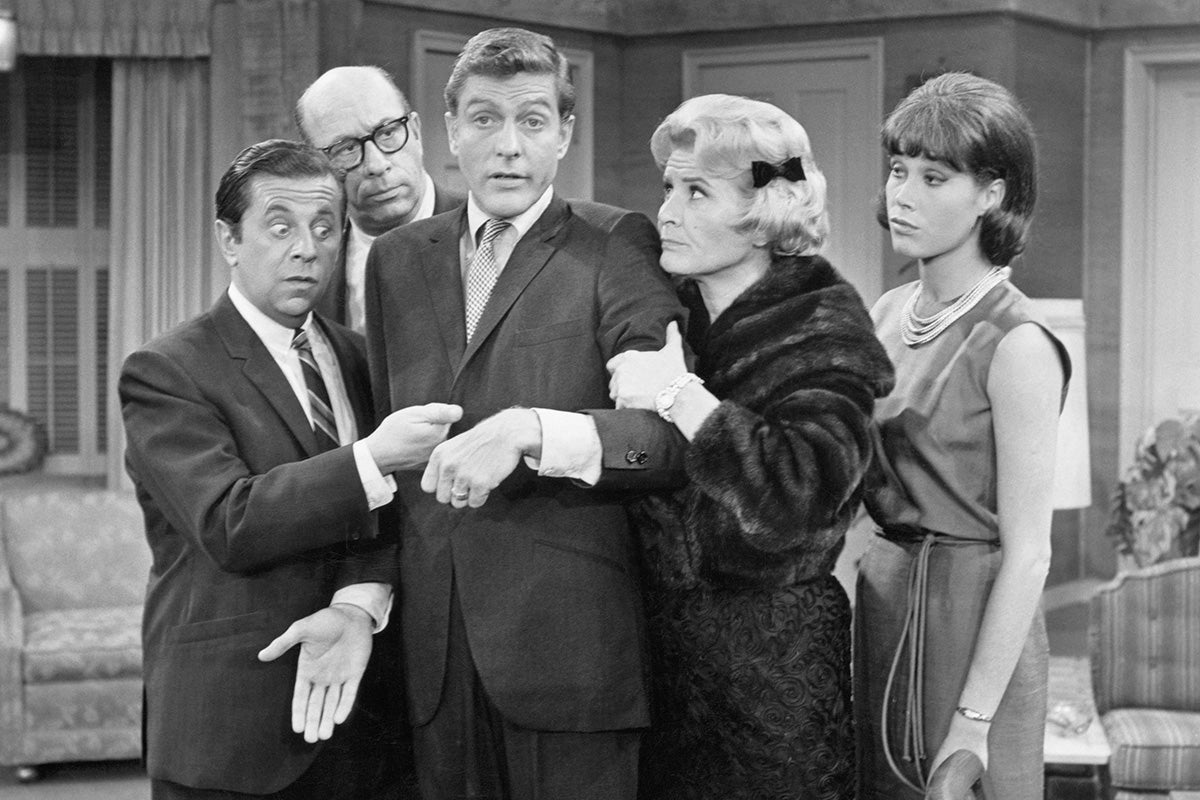Back in 1965, “The Dick Van Dyke Show” went Yiddish. It gave us a song about one of the best Yiddish words out there in an episode named for it: “Bupkis”! This Yiddish word means, among other things, “nothing,” usually uttered derisively, as in: “You know bupkis!”
While it was usually Morey Amsterdam, whose character Buddy Sorrell was Jewish, bringing the Yiddishkeit to the show, this time, it was Van Dyke’s Rob himself who gave audiences across America a worthwhile lesson in the Germanic Jewish tongue.
The episode starts with Rob listening to the radio at home and kvetching about the irritating announcements, when suddenly a familiar song starts playing. Rob is completely befuddled, but can’t help but sing along to its chorus, because, it turns out, it’s a song he wrote.
The song, sung by the fictional band called the Dum-Dums (there is a band called the Dumdums but they were formed in 2001), goes like this: “You took my arm/A golden charm/A diamond, mine/A love so fine/But what did I get from you? Bupkis!/What did I get from you? Bupkis!/Bupkis is a lot of nothing/ And that’s what I got from you.”
The song is infectious and the lyrics are comedy gold; I was howling with laughter at that last line. And while Rob recognizes the song as one that he penned, when he calls in to learn who the talent behind the show is, the name he gets is an infuriating one, and not his: Buzzy Potter.
Later on, Rob sits all melancholy in his office when Buddy and Sally, his co-writers at “The Alan Brady Show,” come in. He’s looking at the music review papers, trying to find a way to see just how popular “Bupkis” is. Buddy can’t believe that it’s a real song. “Bupkis,” he says. “It’s a Yiddish word meaning ‘nothing.'”
“Yeah I know, I wrote it,” Rob tells him.
“You wrote Bupkis?!” Buddy asks incredulously.
“I learned a lot of good words when I was in the army from Saul Pomerantz,” Rob tells Buddy, and continues with a little Yiddish lesson for America, sharing three more words in rapid succession. “Schlemiel,” — the Yiddish word for a clumsy or unlucky person — “farblondjet,” — Yiddish for lost — and “tzimmes,” the delicious Jewish dish of carrots and dried fruit. Van Dyke’s Yiddish pronunciation is really not all that bad, so it seems the Jewish writers on the show helped him out.
Rob then tells Sally and Buddy how Buzzy, nowhere near as prosperous and successful as him, tricked him into giving up the lyrics that he wrote. He later reluctantly shares his misfortune with his wife Laura (Mary Tyler Moore), who wonders about what kind of royalties he’s missing. Rob tells her he hopes the song stays just like its title, a nothing bug. Because, if not, well… “What’s the Yiddish word for ‘boy did I goof’?” Laura suggests, “Oy vey.”
Of course, as it almost always does in the show, created by Jewish genius Carl Reiner, all ends well. Potter is exposed as a crook, and Rob gets his royalties check (which amounts to a little over nine dollars, so really, bupkis). Regardless of the royalties, “Bupkis” the song is an utter delight. It was written, like the rest of the episode, by Jewish writers and songwriters Bill Persky and Sam Denoff. The two won two Emmys for their work on “The Dick Van Dyke Show.” They became a songwriting duo back in the 1950s, and even wrote together an impassioned — but ultimately unsuccessful — musical plea titled “Let’s Keep the Dodgers in Brooklyn.” They wrote another song featured in the episode, “(I’m in Love With) Attila the Hun” which goes: “Though he’ll pillage a village and kill everyone/I still love Attila the Hun.” For “Bupkis,” Denoff was inspired by his Jewish mom who often used the word at home. When she visited the set and saw the episode filmed she rushed to her son and told him he couldn’t air the episode. Bupkis, she told him, doesn’t just mean nothing — it’s actually Yiddish for “goat dung.” While that fact is true — bupkis does come from the Yiddish word for bean that is used to describe goat and sheep dropping for their, well, bean-like quality — I’m glad her protests were fruitless because this episode is such a gift. And honestly, if you think about it, a lover giving you goat poop (as opposed to nothing) is even more hilarious.
“Bupkis,” which aired in the show’s fourth season, is hardly its most Jewish episode. A season later, Buddy has a very late bar mitzvah in an episode that features a rabbi, a cantor and a lot Hebrew peppered in — but this particular episode is definitely a lovely ode to the Jewish tongue that is familiar to so many Jewish Americans. Bupkis — sometimes spelled bupkes or bubkes — is such an utterly delightful word. I’m so glad “The Dick Van Dyke Show” turned it into an amazing song, too.
You can watch “Bupkis” on Tubi.








